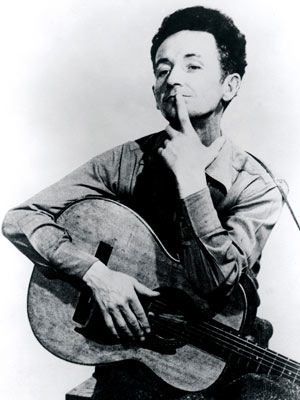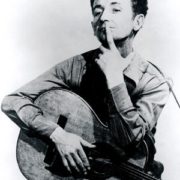Some words on Woody Guthrie
 Woody Guthrie was born on July 14, 1912 in the town of Okemah, Oklahoma.
Woody Guthrie was born on July 14, 1912 in the town of Okemah, Oklahoma.
Okemah is a small town just off Interstate 40, about 70 miles east of Oklahoma City where I-40 splits off from Route 66, also known as the Will Rogers Highway. They call it the Will Rogers Highway because Will Rogers was so famous, and as an American populist he was certainly one of Woody’s important Oklahoma influences. In fact, Will Rogers is the most famous Oklahoman in the whole country and Woody Guthrie is the most famous Oklahoman in the whole wide world.
Lots of folks know that Woody wrote This Land Is Your Land, because they learned it in elementary school, and it has long been considered an unofficial national anthem. What many people don’t know is that he wrote the original lyric as a kind of response to the song God Bless America, as he looked around and saw the suffering of America’s common people. I’ve always thought he wanted to claim this land and the country for himself and you and me. There are some more rarely heard verses to the song that talk about no trespassing signs, poor folks lined up at the relief office, and about not being stopped by anything or anyone as he walked down the “freedom” highway.
Indeed, Woody wrote songs on just about every subject known to man. It is said that he wrote close to three thousand songs, yet during his short life less than one hundred of them were recorded. Woody was also a painter, a visual artist, and a writer of poems, novels, letters, and essays. Woody’s daughter, Nora, directs The Woody Guthrie Archives in New York, the home of Woody’s written and illustrated work.
In 1998 the Woody Guthrie Coalition, an organization of local Okemah business folks and Woody Guthrie enthusiasts was formed. And, at the suggestion of “WoodyFest” visionary and Okemah resident Sharon Jones, the “Woody Guthrie Free Folk Festival” was established in Woody’s hometown with the blessings of the Guthrie family. It was a catharsis for the town, about half of which had historically resented Woody, opposing his “socialist” views. He was accused of being a communist, having sung at some “American” communist rallies, but official membership has never been proved or documented. Woody would just tell folks that he wasn’t a communist, but he had been in the red his whole life. It was one of his jokes, but he always stood up for the common folks.
Woody spent a lot of time in California as well. One of his best friends was actor Will Geer, blacklisted during the McCarthy-era, who was later known for his role as Grandpa in the acclaimed television series “The Waltons.” They met in New York City where Geer was a popular and successful Broadway performer. During the blacklist Geer moved to Topanga Canyon, California, at that time a bohemian enclave about an hour from Los Angeles.
After Woody was diagnosed with Huntington’s Disease, but before he took up permanent residence at the Brooklyn State Hospital due to its devastating effects, he returned to California and spent some time living in a kind of adobe mud hut on Geer’s property. Theatricum Botanicum that Will and his wife Herta established, now directed by their daughter Ellen, is still there, and so is the mud hut.
A few years ago shortly after recording my first album of Woody Guthrie Songs, Woodeye, my managers received a request from a gentleman named Bob DeWitt from Mariposa, California. He and his wife Doreen had lived in Topanga Canyon when Woody was there, and wanted me to play some songs at a gathering in Mariposa to celebrate Woody’s life in the year of his 90th birthday. They told me that Will and Herta Geer had been their neighbors in Topanga and that Woody had spent time with them and even lived at their place for awhile. In fact, Bob sold Woody a piece of property (the side of a hill) in Topanga Canyon for a $250.00 deposit, and Woody met his third wife, Anneke Van Kirk Marshall in the Dewitt’s barn where there was a ceramics studio with a couple of potter’s wheels. Bob told me the story of how he and his wife first met Woody.
They were sitting on their porch one morning when they saw Woody walking down Topanga Canyon Road with a guitar slung on his back. Bob said, “Doey, go tap that feller on the shoulder and ask him to come play us a song.” Doey, a diminutive well-coordinated woman jumped down the porch steps and ran after Woody. When she caught up with him, she tapped him on his shoulder to get his attention. Woody spun around, gave her and angry look, and yelled, “Get away!” Then, he turned back around and kept walking down the road. A few hours later Will Geer drove up the road to the DeWitt place and Bob noticed Woody was in the passenger seat. As they got out of the car, Bob said, “Why that’s the feller who wouldn’t play us a song earlier.” Will looked at Woody and then looked at Bob and replied, “Well he’ll play you one now. He needs a place to live, because Herta won’t let him live with us anymore.”
Woody was no saint, and probably not the easiest person to live with, but I’ve heard it said that even in those times when he had over stayed his welcome, as soon as he had hit the road, his creative presence was sorely missed. He traveled all over this great country, and whenever I journey to some new place that I have not been before, invariably I find that Woody has already blazed the trail.
Joel Rafael will be performing at the “Guthrie Weekend in the Inland Empire” which happens on April 8-10 and at the L.A. Acoustic Music Festival at the Santa Monica Broad Stage. For more information, go to L.A. Acoustic Music Festival.
Whether telling his own tales or wrapping his artistry around the songs of Woody Guthrie and others, Joel Rafael mixes traditional folk idioms with contemporary ideas and sensibilities in a way that both transcends the moment and is fully present in it. Just call it timeless.













